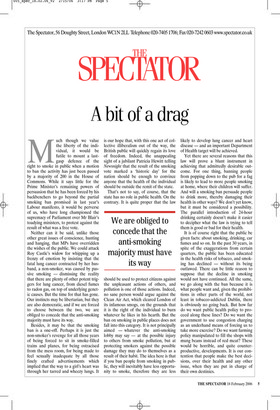A bit of a drag
Much though we value the liberty of the individual, it would be futile to mount a lastgasp defence of the right to smoke in public when a motion to ban the activity has just been passed by a majority of 200 in the House of Commons. While it says little for the Prime Minister’s remaining powers of persuasion that he has been forced by his backbenchers to go beyond the partial smoking ban promised in last year’s Labour manifesto, it would be perverse of us, who have long championed the supremacy of Parliament over Mr Blair’s toadying ministers, to protest against the result of what was a free vote.
Neither can it be said, unlike those other great issues of conscience, hunting and hanging, that MPs have overridden the wishes of the public. We could attack Roy Castle’s widow for whipping up a frenzy of emotion by insisting that the fatal lung cancer contracted by her husband, a non-smoker, was caused by passive smoking — dismissing the reality that there are plenty of other potent triggers for lung cancer, from diesel fumes to radon gas, on top of underlying genetic causes. But the time for that has gone. Our instincts may be libertarian, but they are also democratic, and if we are forced to choose between the two, we are obliged to concede that the anti-smoking majority must have its way.
Besides, it may be that the smoking ban is a one-off. Perhaps it is just the non-smoker’s revenge for all those years of being forced to sit in smoke-filled trains and planes, for being ostracised from the mess room, for being made to feel sexually inadequate by all those finely crafted advertisements which implied that the way to a girl’s heart was through her tarred and wheezy lungs. It is our hope that, with this one act of collective illiberalism out of the way, the British public will quickly regain its love of freedom. Indeed, the unappealing sight of a jubilant Patricia Hewitt telling Newsnight that the result of the smoking vote marked a ‘historic day’ for the nation should be enough to convince anyone that the health of the individual should be outside the remit of the state.
That’s not to say, of course, that the state has no role in public health. On the contrary. It is quite proper that the law should be used to protect citizens against the unpleasant actions of others, and pollution is one of those actions. Indeed, no sane person would argue against the Clean Air Act, which cleared London of its infamous smogs, on the grounds that it is the right of the individual to burn whatever he likes in his hearth. But the ban on smoking in public places does not fall into this category. It is not principally aimed — whatever the anti-smoking lobby may say — at the possible injury to others from smoke pollution, but at protecting smokers against the possible damage they may do to themselves as a result of their habit. The idea here is that if you ban people from smoking in public, they will inevitably have less opportunity to smoke, therefore they are less likely to develop lung cancer and heart disease — and an important Department of Health target will be achieved.
Yet there are several reasons that this law will prove a blunt instrument in achieving that admittedly desirable outcome. For one thing, banning people from popping down to the pub for a fag is likely to lead to more people smoking at home, where their children will suffer. And will a smoking ban persuade people to drink more, thereby damaging their health in other ways? We don’t yet know, but it must be considered a possibility. The parallel introduction of 24-hour drinking certainly doesn’t make it easier to decipher what the law is trying to tell them is good or bad for their health.
It is of course right that the public be given facts: about smoking, drinking, car fumes and so on. In the past 30 years, in spite of the exaggerations from certain quarters, the public has been educated in the health risks of tobacco, and smoking has declined — without its being outlawed. There can be little reason to suppose that the decline in smoking would not have continued. All the same, we go along with the ban because it is what people want and, given the prohibitions in other parts of the world, not least in tobacco-addicted Dublin, there is obviously no going back. But how far do we want public health policy to proceed along these lines? Do we want the government to use congestion charging as an underhand means of forcing us to take more exercise? Do we want farming policy manipulated to fill the shops with mung beans instead of red meat? These would be horrible, and quite counterproductive, developments. It is our contention that people make the best decisions, over their health and any other issue, when they are put in charge of their own destinies.


















































































 Previous page
Previous page